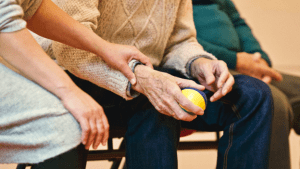Many seniors admit that as they grow old, they prefer to settle down and stay rooted. Aging in place has its benefits, but some family members might be concerned about the state of their elderly loved ones in such cases. Concerns such as house chores, safety, and general isolation are a problem for these situations. In such cases, it may be time to consider companion care.
Companion care is a type of long-term care tailormade for seniors and tackles many of the challenges of living alone as an elderly person. Today, we’ll talk about the benefits provided by companion care, and why it’s so important for the elderly to have someone taking care of them.
Independence
A helping hand does not mean an elderly person becomes even more dependent. If anything, companionship actually enhances the feeling of independence. The fact is that as we grow old, we become less capable of doing self-sufficient activities such as driving or sports. Some family caregivers may also start losing their sense of freedom, as all their time becomes dedicated to their aging family.
A companion reduces all those worries. With a companion, the senior now has someone who can watch over them as they go about their daily life. They don’t have to be stuck at home because now, someone is around to watch them. Family caregivers also lessen their stress because they share the responsibility with a professional. In turn, this makes the elderly family member feel less guilty.
Strong social bonds ensure that an elderly individual continues to be happy and active, even in the twilight of their life.
Companionship
Unsurprisingly, something called companion care provides this benefit in spades. Social connections are important in raising the self-esteem of the elderly. A companion lets your senior loved one enjoy the big and small things with a friendly companion.
It’s a minor benefit to some, but people severely underestimate how much having someone with you improves one’s mental health. A companion assists your loved ones by teaching them important self-care rituals such as meditation, massage, and morning hygiene.
Validation
A lot of elderly people dread the fact that the world is passing them by. They operate under the false assumption that they are nothing but a burden, and for those suffering from diseases such as Alzheimer’s, this feeling is doubled in their moments of lucidity. The fear of being a burden only strengthens with every passing year.
A companion alleviates all those issues. In addition to helping the elderly’s quality of life, they also provide a comfortable presence for them. Depression in advanced age can be prevented by someone simply being in a home with the person. Companions communicating with your senior family member means they will always feel seen and heard.
For example, if a senior family member performs an accomplishment, such as succeeding at a difficult hobby or task, the companion is there to provide them with emotional support. Validation is a powerful thing because no person wants to feel alone.
Comfort
For the elderly, sudden change can be incredibly upsetting. Moving to a new place, their children leaving to start their own lives, and a plethora of other life stuff could be very detrimental to their mental state. Anxiety, fear, and depression are common for lonely senior citizens. Thus, most senior citizens prefer the comforts of settling down.
Companionship in a familiar place, such as a family home, leads to many benefits. Familiarity, comfort, and safety are only some of the benefits that come with staying in one place with a companion to care for them. Practically, it’s usually financially viable as there are no moving costs and also means they stay close to the friends they have made in the neighborhood.
Peace of Mind
Lots of family members may be concerned about leaving their elderly loved ones alone. Many senior adults do not like the idea that they make their children/younger family members feel “guilty” for leaving them. For the family who does choose to become caretakers, feelings of bitterness and depression may also ensue. Some cannot shoulder the anxiety of not having 100% of their time belong to them.
Hiring a companion fixes a lot of these issues. Some may balk at this idea as shoving responsibility of a loved one onto someone else, but that is simply untrue. Having your own free time is also important in caring for your loved one. They would not enjoy the idea of being your anchor (in the negative sense).
In addition, companions are trained exactly for this purpose. Certain things that you may struggle with are not a problem for a professional companion. They are trusted to give all of their focus to your loved one.
Conclusion
Companion care is a beneficial decision. The benefits above clearly outline why companion care should not be set aside as a “half-measure” in taking care of your elderly loved ones. Companions enhance your loved one’s life, and they are NOT a replacement for you. Make sure that you still visit your senior loved one regularly, and stay in contact with their companion for updates.

